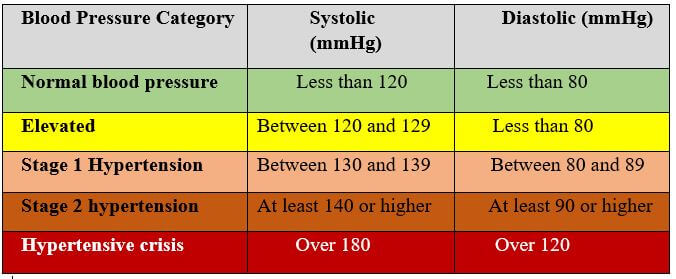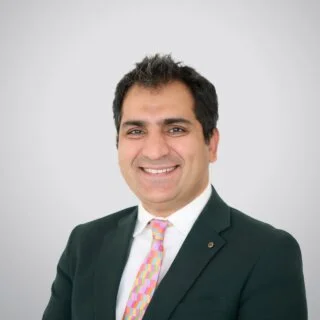Hypertension or high blood pressure is a condition in which your blood pressure increases to unhealthy levels and may eventually lead to health problems such as heart disease.
Blood pressure is determined by the volume of blood pumped by the heart, and the measure of resistance to blood flow in the arteries. Usually, narrow arteries have more resistance, which means, the more narrow the arteries are, the higher the blood pressure.
High blood pressure develops over the course of several years and you may not notice any symptoms as it’s developing. However, it can still cause damage to your blood vessels and organs such as the heart, brain, eyes and kidneys even if the symptoms are not showing.
Early detection is important as uncontrolled hypertension increases the risk of serious health conditions, including stroke and heart attack. Fortunately, it is quite simple to detect high blood pressure and if you have it, you can work with your physician on ways to control it.
Causes of High Blood Pressure
There are two types of high blood pressure, with each having a different cause.
Primary hypertension
Primary hypertension is also known as essential hypertension and tends to develop gradually over time with no identifiable causes. Most individuals have this type of hypertension.
Secondary hypertension
Secondary hypertension occurs suddenly, and it is usually caused by an underlying condition, and can become more severe than primary hypertension. Secondary hypertension can be caused by several conditions such as:
- Kidney disease
- Obstructive sleep apnea
- Conditions with the thyroid
- Congenital heart defects
- Side effects of various medications
- Adrenal gland conditions
- Chronic use or abuse of alcohol
- Certain endocrine tumours
Symptoms of High Blood Pressure
High blood pressure is a silent condition and most individuals rarely experience any signs and symptoms. It can take many years for the symptoms to become obvious and even then, the symptoms might be attributed to other issues. The symptoms of hypertension include:
- Shortness of breath
- Nosebleeds
- Headaches
- Dizziness
- Flushing
- Chest pain
- Visual changes
- Blood in urine
You do not have to wait for the symptoms to appear in order for you to see a doctor because by the time they are appearing it means the blood pressure is at a dangerous level. It is important to get regular blood pressure readings especially if you are at a risk of developing it such as having a family history of heart disease.
Diagnosis of High Blood Pressure
Diagnosing high blood pressure simply requires a reading, and most physicians check blood pressure as part of a routine visit. However, hypertension is not diagnosed after just one reading as the environment, such as stress, can contribute to increased blood pressure and blood pressure levels also tend to change throughout the days. Because of this, your physician may request you to have more readings over the next few days or weeks as he/she needs to see evidence of a sustained condition.
In cases where the blood pressure remains high, more tests are conducted to rule out underlying conditions. The tests include:
- Urine test
- Electrocardiogram to test your heart’s electrical activity
- Cholesterol screening
- Ultrasound of the heart or kidneys
Blood pressure reading is given in two numbers of millimetres of mercury (mm Hg). The upper number is the systolic pressure which measures the pressure in the arteries when the heart beats. The lower number is the diastolic pressure and it measures pressure in the arteries between beats.
There are five categories that define blood pressure readings in adults:
If the reading indicates a hypertensive crisis, the test should be repeated in 2-3 minutes. If the reading is the same or higher, it indicates a medical emergency and the person should be taken to the nearest hospital.
Treatment of High Blood Pressure
The type of hypertension and the causes will help in determining the best treatment option for you.
Treatment of Primary hypertension
If you are diagnosed with primary hypertension, your doctor may recommend lifestyle changes to help in lowering the high blood pressure. If the lifestyle changes are not enough, you may be prescribed medication.
Treatment of Secondary hypertension
Treatment for secondary hypertension is usually focused on the underlying condition. If the hypertension is still persistent despite treating the underlying condition, you may be recommended some lifestyle changes and prescribed medication to help reduce your blood pressure.
Hypertension treatment plans tend to evolve hence what worked for you at first may become less useful over time. Your physician will work with you to refine your treatment.
Medications for hypertension include:
- Beta-blockers and alpha-blockers
- Diuretics
- Calcium-channel blockers
- Central alpha agonists
- Vasodilators
- Peripheral adrenergic inhibitor
- Angiotensin-converting enzyme (ACE) inhibitors
- Angiotensin receptor blockers
Next Step
At King’s College Hospital Dubai, we focus on offering an exemplary service from initial consultation through to the final diagnosis and treatment and beyond. Our team of expert doctors and nurses are here to offer tailored management and treatment of your condition, and to answer any questions that you might have throughout your time with us. Whatever you need us for, we’re only a phone-call away.
If you’d like to book an appointment, simply fill in the appointment form below.
Faqs
الأسئلة الأكثر شيوعا
Dr. Mehmood (Consultant Interventional Cardiologist), Dr. Omar Hallak (Consultant Interventional Cardiologist), Dr. Jose Carlos Moreno Samos (Consultant Interventional Cardiologist), Dr. Layla Al Marzooqi (Specialist Cardiologist & Aeromedical Examiner) and Dr. Ali K Moussavi (Specialist Cardiologist) are considered the best Cardiologists in Dubai.
BOOK AN APPOINTMENT






